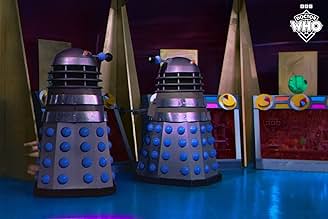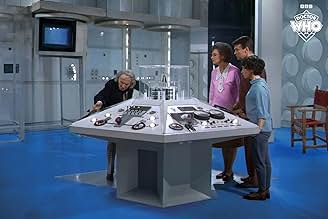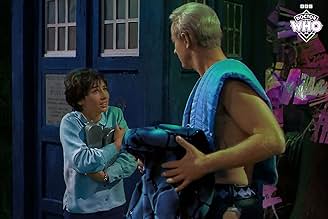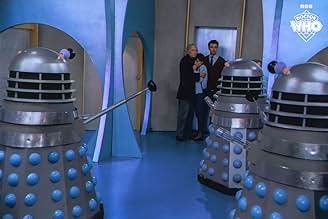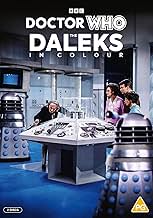Füge eine Handlung in deiner Sprache hinzuAs part of the 60th anniversary celebrations of Doctor Who, the first Dalek story has been dazzlingly colourised and weaved into a 75-minute blockbuster.As part of the 60th anniversary celebrations of Doctor Who, the first Dalek story has been dazzlingly colourised and weaved into a 75-minute blockbuster.As part of the 60th anniversary celebrations of Doctor Who, the first Dalek story has been dazzlingly colourised and weaved into a 75-minute blockbuster.
William Hartnell
- The Doctor
- (Archivfilmmaterial)
William Russell
- Ian Chesterton
- (Archivfilmmaterial)
Jacqueline Hill
- Barbara Wright
- (Archivfilmmaterial)
Carole Ann Ford
- Susan Foreman
- (Archivfilmmaterial)
Alan Wheatley
- Temmosus
- (Archivfilmmaterial)
Philip Bond
- Ganatus
- (Archivfilmmaterial)
Virginia Wetherell
- Dyoni
- (Archivfilmmaterial)
Marcus Hammond
- Antodus
- (Archivfilmmaterial)
Jonathan Crane
- Kristas
- (Archivfilmmaterial)
Gerald Curtis
- Elyon
- (Archivfilmmaterial)
David Graham
- Dalek Voices
- (Archivtonaufnahmen)
Peter Hawkins
- Dalek Voices
- (Archivtonaufnahmen)
Robert Jewell
- Dalek
- (Archivfilmmaterial)
Kevin Manser
- Dalek
- (Archivfilmmaterial)
Peter Murphy
- Dalek
- (Archivfilmmaterial)
Michael Summerton
- Dalek
- (Archivfilmmaterial)
Gerald Taylor
- Dalek
- (Archivfilmmaterial)
Empfohlene Bewertungen
Since Doctor Who returned to our screens nearly twenty years ago now, those familiar with its 20th century incarnation have likely had a pecuilair thought from time to time: what would the old series have looked like if it been made like that? In time for Doctor Who's 60th anniversary in 2023, that is exactly what happened with The Daleks in the form of a 75 minute colorized version. Would the final result be blasphemy or a revelation?
To make the idea work, one needs a serial that actually benefits from being given something a more modern polish and pace. That first Daleks serial is such an example. Yes, it's the first Dalek story, a classic, and the thing that perhaps singlehandedly guaranteed that Doctor Who would have a future beyond 13 episodes. On the other hand, given the Peter Cushing film managed to cut Terry Nation's scripts down to about 80 minutes, it's clearly a story with more than a fair amount of padding. This new edit from Benjamin Cook proves that by offering a fast-moving version of it that, honestly, doesn't lose much in terms of actual plot. Indeed, condensing things like the cave trek to the city by Ian and Barbara alongside the Thals improves rather than detracts.
And what of the colorization? On the whole, it looks remarkably good. The color choices are vivid, evoking the Technicolor spectacle of the Cushing film while also making some decisions of its own such as giving Barbara a bright pink blouse. It's something that is immensely effective except in a handful of shots where the original film quality isn't great to begin with. On the audio front, the new sound mix from Mark Ayers adds so much depth, especially considering the "as live" nature of the original recording limited the soundscape beyond what could be played into the studio. Perhaps the prime example of Ayers new work comes in the scene where Ian and the Doctor pull the creature out of the Dalek shell. An already memorable moment, it has never been more chilling than it is with the added creature sound effects. Tip of the hat, too, on the score from Ayers that wonderfully compliments the original Tristram Cary score by and large.
Is it perfect? No, of course it isn't. It does get flashback heavy in places, yes, a necessity to cover some of the editing choices made by Cook. The escape sequence where Ian is in the Dalek plays out as a nice heist like scene but the cutting back and forth is rapid to the point of approaching confusion. It perhaps wouldn't have been a bad thing to take a further cue from the Cushing film and it let run to 80 minutes to give it a bit more chance to breathe. And, like with much of Modern Who, there are times when the sound mix and music does threaten to intrude on dialogue.
Is it a worthwhile venture? For this reviewer, undoubtedly. Can I see why some Classic Who fans feel it to be at best unnecessary or, at worst, an attempt to invalidate a classic? To an extent, yes. It's something that, along with criticism of The Daleks in Color pre-broadcast comes from those who have the view of Classic Who and archive TV in general as something sacred and untouchable. Things which, as Russell T Davies says in the making of included on the Blu-Ray release, it isn't meant to be viewed solely as museum pieces. Or, indeed, lest we forget that museum's renovate to find new ways of presenting things to visitors.
That is ultimately what The Daleks in Color accomplishes. It's an engaging vision of a classic story, one that ultimately preserves the best of what could have been a moribund museum piece and shows it in a whole new light (or, rather, color). Does it replace the original? Nope, it's even included as an extra on the Blu-ray release. The result is a revelation for fans of Classic and Modern Who alike and one that they can relish partaking in for years to come.
To make the idea work, one needs a serial that actually benefits from being given something a more modern polish and pace. That first Daleks serial is such an example. Yes, it's the first Dalek story, a classic, and the thing that perhaps singlehandedly guaranteed that Doctor Who would have a future beyond 13 episodes. On the other hand, given the Peter Cushing film managed to cut Terry Nation's scripts down to about 80 minutes, it's clearly a story with more than a fair amount of padding. This new edit from Benjamin Cook proves that by offering a fast-moving version of it that, honestly, doesn't lose much in terms of actual plot. Indeed, condensing things like the cave trek to the city by Ian and Barbara alongside the Thals improves rather than detracts.
And what of the colorization? On the whole, it looks remarkably good. The color choices are vivid, evoking the Technicolor spectacle of the Cushing film while also making some decisions of its own such as giving Barbara a bright pink blouse. It's something that is immensely effective except in a handful of shots where the original film quality isn't great to begin with. On the audio front, the new sound mix from Mark Ayers adds so much depth, especially considering the "as live" nature of the original recording limited the soundscape beyond what could be played into the studio. Perhaps the prime example of Ayers new work comes in the scene where Ian and the Doctor pull the creature out of the Dalek shell. An already memorable moment, it has never been more chilling than it is with the added creature sound effects. Tip of the hat, too, on the score from Ayers that wonderfully compliments the original Tristram Cary score by and large.
Is it perfect? No, of course it isn't. It does get flashback heavy in places, yes, a necessity to cover some of the editing choices made by Cook. The escape sequence where Ian is in the Dalek plays out as a nice heist like scene but the cutting back and forth is rapid to the point of approaching confusion. It perhaps wouldn't have been a bad thing to take a further cue from the Cushing film and it let run to 80 minutes to give it a bit more chance to breathe. And, like with much of Modern Who, there are times when the sound mix and music does threaten to intrude on dialogue.
Is it a worthwhile venture? For this reviewer, undoubtedly. Can I see why some Classic Who fans feel it to be at best unnecessary or, at worst, an attempt to invalidate a classic? To an extent, yes. It's something that, along with criticism of The Daleks in Color pre-broadcast comes from those who have the view of Classic Who and archive TV in general as something sacred and untouchable. Things which, as Russell T Davies says in the making of included on the Blu-Ray release, it isn't meant to be viewed solely as museum pieces. Or, indeed, lest we forget that museum's renovate to find new ways of presenting things to visitors.
That is ultimately what The Daleks in Color accomplishes. It's an engaging vision of a classic story, one that ultimately preserves the best of what could have been a moribund museum piece and shows it in a whole new light (or, rather, color). Does it replace the original? Nope, it's even included as an extra on the Blu-ray release. The result is a revelation for fans of Classic and Modern Who alike and one that they can relish partaking in for years to come.
The Doctor, Ian, Barbara and Susan land on a planet that appears to be dead, but just as they're about to set off, Ian spots a fascinating city, an exploration would change the world forever.
First of all, why the release, and the cynic in me seems to think it's to keep on with the commercial releases, we've had the DVDs, box sets, vinyls and blu rays, this means a few more guaranteed releases over the next few years.
So, The Daleks is a favourite of mine, easily my most watched Hartnell, so the idea of tampering with is was just not right.
Let's applaud it for bringing it to a new audience, one that simply cannot watch black and white.
The visuals were decent, I liked the colourisation, what I didn't like was the music, it jarred with the episode quite badly.
The scene I thought worked incredibly well was Barbara's first encounter with The Dalek, the music worked there, and that scene was given a whole new, threatening vibe, I really liked it.
The updated dialogue and special effects, I can't really say I thought they were necessary, some worked better than others let's say.
I get why people dislike it, I can also see it appealing to a new audience, so overall, it's a slow moving thumbs up from me, maybe my score is a little kind, anniversary celebrations and all that.
7/10.
First of all, why the release, and the cynic in me seems to think it's to keep on with the commercial releases, we've had the DVDs, box sets, vinyls and blu rays, this means a few more guaranteed releases over the next few years.
So, The Daleks is a favourite of mine, easily my most watched Hartnell, so the idea of tampering with is was just not right.
Let's applaud it for bringing it to a new audience, one that simply cannot watch black and white.
The visuals were decent, I liked the colourisation, what I didn't like was the music, it jarred with the episode quite badly.
The scene I thought worked incredibly well was Barbara's first encounter with The Dalek, the music worked there, and that scene was given a whole new, threatening vibe, I really liked it.
The updated dialogue and special effects, I can't really say I thought they were necessary, some worked better than others let's say.
I get why people dislike it, I can also see it appealing to a new audience, so overall, it's a slow moving thumbs up from me, maybe my score is a little kind, anniversary celebrations and all that.
7/10.
It should be noted that one of the BBC's stipulations regarding this colourized release of The Daleks, was that it needed to be kept to a 75 minute run time. There was no going against this order. The production crew obviously did their best to pare down the original 175 minutes, but the result is a disjointed mess.
The colourising is for the most part beautifully accomplished. One hopes this process will be put to other classic black & white episodes of the series. However, if any further conversions are produced, editing should be better controlled if not entirely abandoned. As presented, The Daleks-Colourized is 75 minutes of choppy story telling. Many scenes are rushed and others seemingly disorganized. In some instances, characters that were in a scene one moment, are gone the next, though they are not seen leaving nor given time to leave. In another instance, the Doctor and others are trapped on the upper floors of a tower, soon after they are on the edge of entering a jungle with no intervening explanation of their escape.
Other than editing, newly produced music pours over scenes like invading slime, covering dialogue and clashing with action. Choice of music during a scene set in the Dalek Control Room is ponderously bizarre. New special effects, however, are for the most, excellent. Hopefully additional colourized episodes of B&W Doctor Who will be produced without unjust editing. Soundtracks, if not religated to the original, should have a better fit and volume.
A worthy experiment, especially for the brillance of colour. A rating of 5/10 from me.
The colourising is for the most part beautifully accomplished. One hopes this process will be put to other classic black & white episodes of the series. However, if any further conversions are produced, editing should be better controlled if not entirely abandoned. As presented, The Daleks-Colourized is 75 minutes of choppy story telling. Many scenes are rushed and others seemingly disorganized. In some instances, characters that were in a scene one moment, are gone the next, though they are not seen leaving nor given time to leave. In another instance, the Doctor and others are trapped on the upper floors of a tower, soon after they are on the edge of entering a jungle with no intervening explanation of their escape.
Other than editing, newly produced music pours over scenes like invading slime, covering dialogue and clashing with action. Choice of music during a scene set in the Dalek Control Room is ponderously bizarre. New special effects, however, are for the most, excellent. Hopefully additional colourized episodes of B&W Doctor Who will be produced without unjust editing. Soundtracks, if not religated to the original, should have a better fit and volume.
A worthy experiment, especially for the brillance of colour. A rating of 5/10 from me.
On viewing this so called film, it was at the beginning just rushed and ruined, it is far more superior in the TV series, The music soundtrack was a mess with too much dominating every scene you watch, on this it seems that let's put some music here and hope for the best, but most of all the editing from 175 minutes down to 75 minutes was not enough time, it even worked at the normal 95 minutes, but it in common sense would still have. Been rubbish, the people who produced this need to be sacked
Modern blockbuster of which they tried to make made it even more of a shambles.
The colourisation of the TV show was not bad, In all the BBC have failed at this project, please stick to the original TV Doctor Who: The dead Planet.
The colourisation of the TV show was not bad, In all the BBC have failed at this project, please stick to the original TV Doctor Who: The dead Planet.
The rating here is mainly for the colour. The colourisation was well-done. While it doesn't look like it was shot in colour originally, it's a good substitute.
However, the edit here was not good. 175 minutes have been cut down to 75, and that is simply not enough time. The story feels incredibly rushed, with entire scenes cut down to only a montage of a few seconds in places, it genuinely gets hard to follow what's happening at times. There's no opportunity for tension to build up, everything is over before it has a chance to really begin.
And the music just ruins it. They've tried to make it seem like a modern blockbuster, but that's simply not what the footage was shot for. The music is overbearing, dominating every single scene it's in.
If you want to watch The Daleks, watch the original. Watch it in multiple sittings if you must, as it's 3 hours long. And if you want a shorter, more colourful version, watch the 1965 movie adaptation, "Dr Who and the Daleks". I see no reason at all to bother with this version.
However, the edit here was not good. 175 minutes have been cut down to 75, and that is simply not enough time. The story feels incredibly rushed, with entire scenes cut down to only a montage of a few seconds in places, it genuinely gets hard to follow what's happening at times. There's no opportunity for tension to build up, everything is over before it has a chance to really begin.
And the music just ruins it. They've tried to make it seem like a modern blockbuster, but that's simply not what the footage was shot for. The music is overbearing, dominating every single scene it's in.
If you want to watch The Daleks, watch the original. Watch it in multiple sittings if you must, as it's 3 hours long. And if you want a shorter, more colourful version, watch the 1965 movie adaptation, "Dr Who and the Daleks". I see no reason at all to bother with this version.
Wusstest du schon
- VerbindungenEdited from Doctor Who: The Dead Planet (1963)
Top-Auswahl
Melde dich zum Bewerten an und greife auf die Watchlist für personalisierte Empfehlungen zu.
Details
- Laufzeit
- 1 Std. 15 Min.(75 min)
- Farbe
Zu dieser Seite beitragen
Bearbeitung vorschlagen oder fehlenden Inhalt hinzufügen

